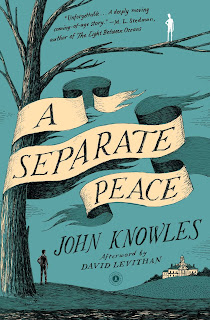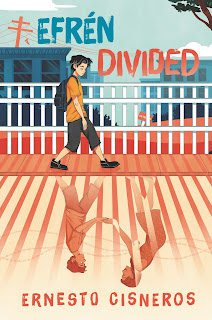MMGM (1/8/2017) Classic Critique: A Separate Peace by John Knowles
Update (4/2/2022): I typically participate in blogging groups that review kids’ books, but sometimes, I do end up reading adult books like this one. In the past, I have typically labeled those books as MG or YA when I review them, primarily because I still want my typically blogging audiences to see them! However, this has become confusing, so I have decided to re-label these books as adult books, while leaving the reviews in their original format. Thank you for your consideration!
Here's the publisher's description:
An American classic and great bestseller for over thirty years, A Separate Peace is timeless in its description of adolescence during a period when the entire country was losing its innocence to World War II.
Set at a boys' boarding school in New England during the early years of World War II, A Separate Peace is a harrowing and luminous parable of the dark side of adolescence. Gene is a lonely, introverted intellectual. Phineas is a handsome, taunting, daredevil athlete. What happens between the two friends one summer, like the war itself, banishes the innocence of these boys and their world.
Cons:
- Each event is negative. I want to start this review with the cons and end with the pros. A Separate Peace is not supposed to be a happy story, as it represents a sad time in the U.S.’s history. However, most authors try to inject happiness somewhere in the story, which Knowles fails at. Every conversation that Gene has, every activity that Finny organizes, every outpouring of poeticism from a now-adult Gene (who seems incredibly pretentious, as I will mention next) fills the reader with emotions that range only from apathy to crushing sadness dulled by exasperation. Even times that are supposed to be happy and joyous, such as the Winter Carnival that Finny organizes, are tainted by the characters' constant meanness and inability to show any true happiness. This rant brings me to my next point:
- The characters are awful in so many ways. I hate several characters in A Separate Peace, one of whom is unfortunately the main character and narrator, Gene. A line early in the novel which best represents the problem I have with Gene is when he criticizes his younger self for being sarcastic and now views sarcasm as “the protest of people who are weak.” The adult Gene and narrator has never overcome the pessimistic attitude of his younger self and forgiven child-Gene. He seems to have become one of those people who has unrealistic expectations for children and finds himself above them. Although this personality and how it has originated from his immense guilt as a child is interesting, it does make for an unpleasant narrator whose intelligent points I cannot help but think are pretentious and ignorant. Finny's naïveté and positivity are annoying and have a nearly-hidden hint of something unpleasant deeper within him, and other characters such as Brinker are just mean (I was upset when, after everything Brinker had done to both Gene himself and others, he still remains friends with him and his adult self makes no mention of it). A Separate Peace shows an interesting portrait of life at a boarding school amongst other boys who have no real direction from parents, but it makes a better case study than gripping read.
Pros:
- The depiction of the war is excellent. Knowles does an excellent job showing all of the shadows that World War II cast over America, as well as how it could seem potentially exciting to kids who want to enlist. Unlike a war of today, in which usually only those who join the armed forces of their own accord fight, WWII ended up requiring many people to be forced to join the army. The students at Devon School in A Separate Peace did not know if they would enter the army only to never have a day of fighting, or if they would take part in whatever horrendous battles were to come, and they also did not know which would be good and which would be bad. A Separate Peace makes me intrigued about the war's effects on ordinary people in America, as opposed to just soldiers and people where the war was fought.
- The way the novel and nature intertwine is incredible. Knowles clearly enjoys the outdoors. He is able to make nearly any scenery, such as the tree at the beginning, into a metaphor for the characters' experiences (I wrote an entire essay on how he uses weather this way), and his descriptions of the outdoors as Gene walks between buildings or plays outside are just lovely. If I could jump right into the scenery of this book, I definitely would! Even the characters love being outdoors: kids jump out of a tree, swim in the lake, visit the beach (against the rules), play a made-up game known as blitzball (named after the blitzkrieg of the war), or even ski.
Verdict:
In writing this review, I came to an interesting conclusion: John Knowles should have been a poet instead of an author. He had incredible talent with regards to figuring out how people think and are affected by the events of their lives, and he was also excellent with metaphors and imagery. However, he had trouble creating characters that people could root for and designing a plot that people would race through (neither of which would have been a problem in the short-form art of poetry). All in all, Knowles was able to write a book which had many great qualities, helping to make it a classic, but several large missteps, which may be harder for future readers to overlook.




What a thought...that Knowles should have been a poet!
ReplyDeleteI never read this. It sounds too negative for me, even if it is a classic. Glad you got through it for school.
ReplyDeleteI remember this one being assigned to me in a class. I did enjoy it at the time, but your appraisal is spot on.
ReplyDeleteI have not read this, even though the theme of boarding schools in the US during WWII would have intrigued me. I don't like that the characters don't show growth -- but then we can look at a many adults today and wonder what happened to them as children to make them so negative. Interesting that you felt Knowles would have been a better poet than author. Thank you for the review.
ReplyDeleteI confess that I haven't read this one, and probably never would have considered it if not your review. Now I feel better informed and might get into it in order to read the good parts! Thanks so much, and happy MMGM!
ReplyDeleteI read this one in grad school. I agree it is well-written, but very sad. However, it did not stand out to me too much at the time because so much of modern literature is. The teacher who assigned it especially had a propensity toward the hopeless, alienation, unhappy ending. type books. Before grad school, I would have avoided those books, but now I appreciate them too. Thanks for the review.
ReplyDeleteThis sounds like an interesting book. I haven't read it, but I tend to read a lot of sad books (just finished The Book Thief) and maybe I'll pick this one up. It seems like something that would possibly intrigue me so maybe I'll check it out.
ReplyDelete